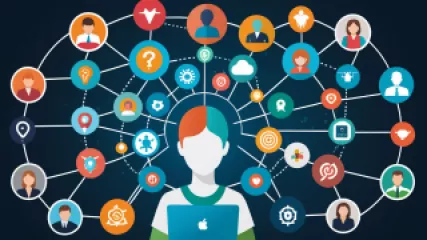Exploring Intelligence Theories: What Role Does Online Therapy Play in Intelligence Enhancement?
Introduction
Intelligence is a fascinating concept that has intrigued researchers and psychologists for centuries. Theories of intelligence have evolved over time, attempting to explain the essence of intelligence and how it impacts human behavior and cognition. From the early mental abilities theories to the more recent emotional intelligence theory, our understanding of intelligence has continued to expand.
In this article, we will delve into the world of intelligence theories and explore the role that online therapy plays in enhancing intelligence. We will examine various perspectives on intelligence and its measurement, and discuss how online therapy can be utilized as a tool for intelligence enhancement.
Theories of Intelligence
Throughout history, numerous theories have emerged in an attempt to explain intelligence from different angles. Let's explore some of the key theories:
1. Mental Abilities Theories
Mental abilities theories view intelligence as a collection of cognitive processes and skills that can be measured through various tests. One prominent theory in this category is the general intelligence theory proposed by Charles Spearman. According to Spearman, intelligence consists of a general factor (g) that underlies all specific mental abilities.
Another influential theory in this category is Howard Gardner's theory of multiple intelligences. Gardner suggests that intelligence is not a single entity, but rather a combination of several independent forms of intelligence, including linguistic, logical-mathematical, musical, bodily-kinesthetic, interpersonal, intrapersonal, naturalistic, and spatial.
2. Emotional Intelligence Theory
Emotional intelligence theory focuses on the ability to perceive, understand, and manage emotions effectively. This theory, popularized by Daniel Goleman, posits that emotional intelligence (EI) plays a crucial role in personal and social success. EI encompasses skills such as self-awareness, self-regulation, motivation, empathy, and social skills.
Individuals with high emotional intelligence are often better equipped to navigate social situations, manage stress, and build strong relationships. They have a deeper understanding of their own emotions and the emotions of others, which contributes to their overall intelligence.
3. Educational Psychology Theories
Educational psychology theories focus on how individuals acquire knowledge and develop intellectual abilities. Jean Piaget's theory of cognitive development suggests that intelligence evolves through distinct stages, from sensorimotor (birth to 2 years) to formal operational (adolescence and beyond). Piaget believed that individuals construct their understanding of the world through assimilation and accommodation.
Lev Vygotsky's sociocultural theory emphasizes the role of social interaction and cultural influences in cognitive development. According to Vygotsky, intelligence is shaped through collaborative learning, social scaffolding, and the internalization of cultural tools.
The Role of Online Therapy in Intelligence Enhancement
As our understanding of intelligence has grown, so has our ability to enhance and develop it. One avenue that holds promise for intelligence enhancement is online therapy. Online therapy, also known as e-therapy or teletherapy, involves providing mental health services remotely through digital platforms.
Online therapy can contribute to intelligence enhancement in several ways:
1. Cognitive Behavioral Therapy (CBT)
Cognitive Behavioral Therapy (CBT) is a widely used therapeutic approach that focuses on identifying and modifying negative thought patterns and behaviors. CBT can be adapted for online therapy, allowing individuals to work with therapists remotely to challenge and reframe unhelpful thinking patterns.
By addressing cognitive distortions and promoting healthier thoughts and behaviors, CBT can enhance cognitive functioning and problem-solving skills. This, in turn, can positively impact intelligence by improving decision-making, attention, and memory.
2. Access to Resources and Information
Online therapy provides individuals with access to a wealth of resources and information that can support intelligence enhancement. Through online platforms, individuals can explore educational materials, participate in virtual courses or workshops, and engage with communities focused on intellectual growth.
Access to online resources can broaden individuals' knowledge base, expose them to new ideas and perspectives, and facilitate continuous learning. This continuous learning can contribute to the development and enhancement of intelligence.
3. Flexibility and Personalized Learning
One of the advantages of online therapy is its flexibility. Individuals can engage in therapy sessions at a time and place that suits their schedule, allowing for personalized learning and growth. This flexibility extends to intelligence enhancement as well.
Online platforms offer personalized learning experiences tailored to individual needs and preferences. Through adaptive learning technologies, individuals can engage in activities and exercises that target their specific areas of improvement, fostering intelligence enhancement in a way that caters to their unique learning style.
Conclusion
Theories of intelligence have evolved over time, reflecting our expanding understanding of this complex concept. From mental abilities theories to emotional intelligence theory and educational psychology theories, each perspective offers valuable insights into the nature of intelligence.
Online therapy, with its incorporation of cognitive behavioral therapy, access to resources, and personalized learning, holds promise as a tool for intelligence enhancement. By empowering individuals to challenge negative thought patterns, providing access to educational materials, and offering flexible and personalized learning experiences, online therapy can contribute to the development and enhancement of intelligence.
As we continue to explore intelligence theories and discover new ways to enhance and develop intelligence, online therapy stands as a valuable resource in this journey towards intellectual growth.






